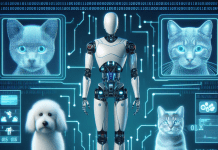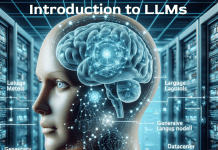Generative AI (Gen-AI) is powerful but faces challenges like data management and cost. Cloud computing offers solutions with scalable storage, pre-built AI services, and lower costs. This unlocks a new era of innovation in personalized experiences, drug discovery, and creative fields. AWS, Azure, and GCP all offer Gen-AI cloud services with options for beginners and experienced users. Consider your needs and choose the platform that best suits your data security, expertise level, and the type of creative tasks you want the AI to handle. This blog post dives into these challenges and how cloud computing empowers Gen-AI solutions.
Challenges in implementing Gen-AI
Generative AI offers a lot of potential, but there are some hurdles to overcome before it can be widely adopted. Here are some of the biggest challenges:
Read: What is Generative AI ?
a. Data & Security
- Generative AI needs massive amounts of high-quality data to train on. This data can be expensive and time-consuming to collect, and it also needs to be clean and unbiased to avoid creating biased or inaccurate outputs from the AI.
- Security and privacy are also concerns when dealing with large amounts of data, especially if it’s sensitive. Companies need to make sure they have strong data governance practices in place to protect user information.
b. Ethics and Bias
- Generative AI models learn from the data they’re trained on, so if that data is biased, the AI will be biased too. This can lead to unfair or discriminatory outputs.
- It’s important to carefully consider the ethical implications of generative AI and develop frameworks to ensure it’s used responsibly.
c. Integration
- Generative AI systems need to be integrated with existing business systems to be useful. This can be a complex task, especially for large organizations.
d. Skills and Talent
- Using generative AI effectively requires specialized skills and knowledge. There’s a shortage of people with these skills, which can make it difficult for companies to implement generative AI solutions.
e. Cost and Resources
Training and running generative AI models can be computationally expensive. This can be a barrier for smaller companies or organizations.
How Cloud Computing can address the above challenges ?
Cloud computing can be a powerful tool to address some of the key challenges hindering generative AI solutions. While cloud computing can’t solve all the challenges of generative AI, it offers a powerful toolkit to address data management, integration hurdles, resource limitations, and even the talent gap by providing access to pre-built services and expertise.
a. Data Challenges:
- Cost and Acquisition: Cloud storage is often cheaper than building and maintaining on-premises infrastructure. Cloud providers also offer data marketplaces where you can access pre-built datasets, saving time and resources on data collection.
- Security and Privacy: Cloud providers invest heavily in security and offer robust data governance tools to ensure user information is protected.
- Scalability: Cloud storage scales easily. As your data needs grow, you can easily add more storage without significant investment.
b. Integration Challenges:
- Legacy System Integration: Cloud services can provide integration tools and platforms to bridge the gap between Gen-AI systems and older infrastructures.
- Cloud-based AI Services: Many cloud providers offer pre-built AI and machine learning services, including generative AI tools. These services integrate seamlessly with other cloud-based applications, making it easier to incorporate generative AI into your existing workflows.
- APIs and Development Tools: Cloud providers offer APIs (Application Programming Interfaces) and development tools that facilitate integration of generative AI models with your specific software systems.
Read: Cloud Computing Basics and Fundamentals
c. Skills and Talent:
- Managed AI Services: Cloud providers offer managed AI services where they handle the infrastructure, training, and maintenance of your generative AI models. This allows you to leverage cloud expertise without needing a team of in-house AI specialists.
d. Cost and Resources:
- Pay-as-You-Go Model: Cloud computing services typically follow a pay-as-you-go model. You only pay for the resources you use, making it a cost-effective solution for running computationally expensive generative AI models.
- Scalability: Cloud resources can be scaled up or down depending on your needs. This allows you to optimize costs by only using the resources you require at a particular time.
e. Ethics and Bias:
- Bias and Fairness: Cloud platforms can provide diverse datasets and tools for monitoring and correcting biases in Gen-AI systems.
- Ethical and Legal Concerns: Cloud providers are increasingly offering governance and compliance tools to help address the ethical and legal challenges posed by Gen-AI systems.
By leveraging cloud computing, organizations can address many of the technical and operational challenges associated with implementing Gen-AI systems as mentioned above, making it easier to harness their potential for innovation and growth.
New Era of innovation: Gen AI with Cloud Computing together !
Generative AI thrives in the cloud. Cloud computing offers the muscle (resources) to train powerful AI models, while Generative AI supercharges the cloud by automating tasks, enhancing security, and creating entirely new applications. This duo is unlocking a new era of innovation.
Read: How GenAI cloud services are modernizing the Cloud applications
Generative AI (GenAI) is significantly impacting the cloud computing landscape by offering innovative solutions to complex challenges. It’s transforming business strategies and operations in several ways. Here are some of the proven examples.
- Automating Tasks: GenAI can automate resource management, dynamically allocating resources based on usage patterns and demand forecasts, leading to more efficient cloud operations.
- Enhancing Cybersecurity: By generating adversarial examples, GenAI helps test and improve the robustness of cybersecurity defenses. It also aids in real-time anomaly detection to identify potential threats.
- Optimizing Workloads: GenAI algorithms analyze workload patterns to optimize task scheduling, which improves performance and reduces operational costs.
- Personalizing User Experiences: In cloud-based applications, GenAI can create tailored content and interfaces by analyzing user behavior, enhancing customer engagement and satisfaction.
Generative AI and cloud computing are in a symbiotic relationship. The cloud provides the infrastructure for AI development, while AI enhances the capabilities and efficiency of cloud services. This powerful combination is driving innovation across various industries and shaping the future of technology.
Gen AI cloud services offered by AWS, Azure and GCP
Below is the detailed comparison of popular cloud services which can be used for implementing Generative AI (Gen-AI) applications in major public cloud providers:
a. Amazon Web Services (AWS)
AWS offers a comprehensive suite of tools and services to empower you with Generative AI (GenAI). Here’s a breakdown:
- AWS has been enhancing its Gen-AI capabilities, particularly through services like Amazon SageMaker JumpStart, which provides an environment to access, customize, and deploy ML models. AWS has added support for foundation models, allowing customers to consume and fine-tune popular open-source models.
- Amazon Bedrock: This is a managed service specifically designed for building, scaling, and deploying generative AI applications. It provides access to leading foundation models and ensures security, privacy, and responsible AI practices are built-in.
- Amazon Titan is a collection of home-grown foundation models built by AWS researchers and internal teams, expected to power services like Alexa and CodeWhisperer.
- Strengths: AWS provides a comprehensive suite of Gen-AI capabilities through services like SageMaker JumpStart.
- Limitations: AWS Gen-AI models can “hallucinate,” generating plausible but incorrect information. Good governance and continuous monitoring are essential to mitigate risks.
- Supported Foundation Models: AWS offers access to a variety of foundation models, including those from AI21 Labs, Anthropic, Stability AI, and exclusive access to the Titan family of foundation models developed by AWS.
b. Microsoft Azure
Microsoft Azure provides a robust set of tools and services for working with Generative AI (GenAI). Here’s a look at some key offerings:
- Azure OpenAI Service: Access industry-leading models from OpenAI (like GPT-4) for tasks like text generation, code creation, and image editing. Leverage them through a user-friendly interface or code.
- Azure Cognitive Services: Integrate pre-built GenAI functionalities like text generation (Text Translation) and image manipulation (Computer Vision) seamlessly into your applications.
- Azure Machine Learning Service: Build, train, and deploy your own generative models. It offers tools for data preparation, training, and cloud deployment.
- Azure AI Studio: This visual environment simplifies GenAI development. Explore pre-built models, build and customize workflows, and integrate your models with other Azure services.
- Strengths: Azure provides a seamless development environment for Gen-AI applications, with integrated AI services and a focus on data safety.
- Limitations: Azure OpenAI imposes certain limits and quotas to maintain performance, such as Tokens-per-Minute (TPM) and Requests-Per-Minute (RPM) rate limits. Planning for data and traffic management is crucial to ensure reliable performance34.
- Supported Foundation Models: Azure’s Databricks Model Serving supports serving and querying foundation models, including DBRX Instruct, Llama-2-70B-chat, BGE-Large, Mistral-7B, and external models like OpenAI’s GPT-4.
Read: Skills required build GenAI apps on AWS, Azure and GCP
c. Google Cloud Platform
Google Cloud is recognized for its strength in AI/ML, offering tools tailored for AI needs. They provide a robust environment for building, training, deploying, and managing Gen-AI models. Google Cloud’s offerings are built on the foundations of advanced models like PaLM, and they have made a series of GenAI-related announcements at events like Google I/O.
- Generative AI Models (Foundation Models): GCP provides access to pre-trained Generative AI models, also known as foundation models. These models are categorized by the content they generate, including text, code, images, and text embeddings.
- Model Agnostic APIs: You can interact with these models through APIs (Application Programming Interfaces) regardless of the specific model you choose. This simplifies integration with your existing workflows.
- Generative AI Studio: This user interface (UI) allows you to experiment with Generative AI. You can test prompt tuning for different models and tasks, essentially fine-tuning the model’s response based on how you word your prompts or questions.
- Model Garden: This beta feature allows data scientists to securely host and fine-tune foundation models without sharing their data with third parties. This provides more control over the training process.
- Integration with Vertex AI: Generative AI services are integrated with the broader Vertex AI platform, offering a unified environment for data management, model training, and deployment alongside other AI functionalities.
- Focus on Responsible AI: GCP emphasizes responsible AI practices. The platform is built with security and privacy considerations in mind to address potential biases and ensure user data protection.
- Strengths: Google Cloud is known for its strong AI/ML offerings, with tools for building, training, deploying, and managing Gen-AI models.
- Limitations: Google Cloud’s Gen-AI models, like Gemini, have limitations in spatial reasoning, counting, understanding longer videos, and following complex instructions. They are not suitable for medical uses or multi-turn chatbot functionality.
- Supported Foundation Models: Google Cloud’s Vertex AI features a growing list of foundation models, including Gemini API models for multimodal data and PaLM API models for text and chat.
How to choose the right GenAI Cloud service?
The best cloud service for Gen-AI depends on your specific needs. Choosing the right cloud provider for Generative AI (Gen-AI) projects involves several key considerations to ensure that the provider aligns with the organization’s specific needs and goals. Here are some factors to consider:
- Your level of expertise: Pre-built solutions might be ideal for beginners, while experienced users may prefer custom development tools.
- The type of generative tasks you need: Consider the specific content you want the AI to generate (text, code, images, etc.).
- Generative AI Models: Evaluate if the provider offers foundation models that suit your project requirements, such as those available through AWS SageMaker JumpStart, Google Cloud’s Vertex AI, or Azure OpenAI API.
- Development Tools: Look for providers that offer robust development tools and platforms that facilitate the creation and deployment of Gen-AI applications, like Amazon Bedrock or Azure ML integration.
- Customization and Fine-Tuning: Ensure the cloud provider allows for customization and fine-tuning of foundation models to tailor the Gen-AI solutions to your specific needs.
- Operational Support: Consider the operational support provided by the cloud service, such as vector search support in Azure Cosmos DB and Cache for Redis, which can be crucial for Gen-AI operations.
- Additional Tools and Services: Check for additional tools and services that can aid in application development, like Google’s GenAI Studio or Azure’s investment in open-source projects.
- Scalability: The cloud provider should offer scalable solutions that can grow with your Gen-AI projects, accommodating increased workloads without compromising performance.
- Data Privacy and Security: Data protection is paramount, so it’s important to choose a provider with strong security measures to safeguard the data used by Gen-AI systems.
- Cost: Consider the pricing options and ensure they align with your budget. Look for transparent pricing models that can help predict and control costs.
- Expertise and Reputation: Research the provider’s expertise in Gen-AI and their market reputation. A provider with a strong track record in AI can be a more reliable choice.
- Ease of Integration: The cloud service should integrate well with your existing systems and workflows, minimizing disruption and facilitating a smooth transition.
By carefully evaluating these factors, organizations can select a cloud provider that not only meets their current Gen-AI project needs but also supports their future growth and innovation.



